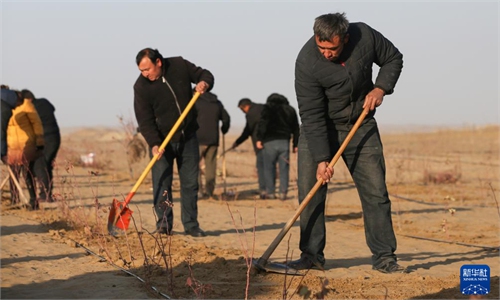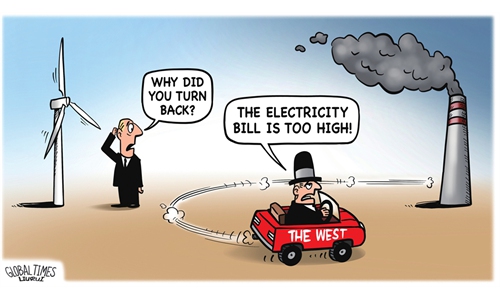Environment-related jobs gain traction as China speeds up its low-carbon, high-quality development

A contestant from East China's Shandong Province showcases his entry when attending the 17th National University Student Social Practice and Science Contest on Energy Saving and Emission Reduction on August 5, 2024. Photo: IC
China has entered a stage of high-quality development marked by green and low-carbon initiatives, giving rise to new green professions and a growing demand for specialized talent.
The 2022 edition of the "Occupational Classification of the People's Republic of China" identifies 134 green professions, comprising about 8 percent of all occupations. Data indicates that during the 14th Five-Year Plan period (2021-25), China will require 550,000 to 1 million professionals for its dual-carbon initiative, which aims to peak carbon emissions by 2030 and achieve carbon neutrality by 2060.
Currently, however, only around 100,000 individuals are employed in these fields, leaving a substantial talent gap, the China Youth Daily reported.
The Global Times interviewed people working in the emerging environment-related professions to share their stories of contributing to a greener China.
Guardians of carbon reduction
Controlling corporate carbon emissions is a key strategy for many countries to achieve their carbon neutrality goals. In the global green transition, trading carbon emission allowances has become mainstream.
Carbon emissions managers, an emerging profession, play a crucial role. They are responsible for monitoring, accounting, verifying, trading and consulting on emissions of carbon dioxide and other greenhouse gases.
A 33-year-old employee of the Shenzhen Emissions Exchange, surnamed Chen, works on carbon trading and near-zero carbon projects. Formerly in the financial sector, Chen pivoted to this field in 2020 after recognizing the potential of carbon trading following China's announcement of its dual-carbon goals.
"Our responsibilities go beyond facilitating carbon trading for companies," he explained. "We also design energy-saving and emissions-reduction solutions, assist companies in optimizing production processes and promote renewable energy use to lower emissions."
The rapid growth of green professions has outpaced the supply of qualified professionals, creating a significant talent gap. For example, many companies struggle to recruit experts in environmental, social and governance practices or carbon footprint analysis. To address this, some organizations are developing talent in-house or collaborating with partners, Ma Jun, director of the Beijing-based Institute of Public and Environmental Affairs, noted.
Beyond the positions that need specialized background, the growth of the circular economy and the popularization of low-carbon lifestyles have encouraged more individuals to find a career in the green industry.
Su Yu, 25, is a smartphone recycling and quality control engineer in the Zhuanzhuan Group's intelligent inspection center in Qingdao, East China's Shandong Province. He tests over 200 second-hand phones daily for screen functionality. These recycled devices reduce resource waste and contribute to the circular economy.
By the end of 2023, the platform of Zhuanzhuan had facilitated a cumulative carbon reduction of 4.11 million tons and saved 5,625 GWh of energy, equivalent to the annual consumption of 470,000 Chinese households.
"Through standardized quality inspection services, we enable more idle smartphones to be effectively recirculated, which not only reduces resource waste but also contributes to the development of the circular economy. It is a highly meaningful job," Zhang, a colleague of Su, told the Global Times.
Green 'doctors'
At a university in northern China, air conditioning is automatically turned on and off based on students' class schedules and the weather conditions. The emergence of building energy conservation and emission reduction consultants has led to the development of a "green plan" for the entire campus, which includes upgrading to the most suitable energy-saving facilities and creating an intelligent system that allows equipment to operate autonomously. The campus, as a result, has achieved an annual reduction in carbon emissions of approximately 3,500 tons.
Liu Yimin, a senior engineer at a company subordinate to the China Academy of Building Research, likens the role of a "building energy conservation and emission reduction consultant" to that of a "doctor for building energy consumption."
He told the Global Times that the main responsibility of this profession is to identify the causes of high energy consumption and carbon emissions in buildings and to propose effective and feasible solutions to address these "ailments."
Liu said that to become a building energy conservation and emission reduction consultant, one must master the fundamental knowledge of heating, ventilation, and air conditioning, be familiar with the composition and operation of various systems, and possess knowledge in energy auditing and carbon emission calculation. Moreover, a consultant needs to understand energy consumption simulation and constructing mathematical models.
By making buildings "green," a new profession dedicated to wetland restoration, has gained popularity in China in recent years.
The Caijia river basin in Beijing's Yanqing district is one of the large-scale forest wetland sections in the city's first round of the million-acre plain afforestation project. It is also an early wetland restoration project designed by Zhang Manyin's team.
According to Zhang, this wetland was not designed as a particularly large water surface in the conventional sense, but rather consists of multiple winding streams and marshes. Zhang, who has participated in numerous wetland restoration projects, is the proponent of the new profession "Wetland Protection and Restoration Engineering Technician." In 2022, this profession was included in the National Occupational Classification Directory. "Our country is increasingly emphasizing wetland protection and restoration, providing support from various aspects such as legal and supporting systems, financial investment, and engineering technical talent assurance," said Zhang.


